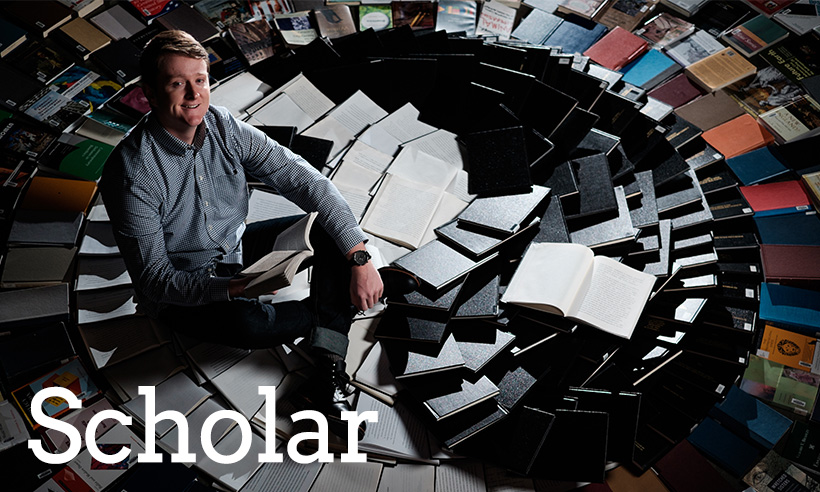A Q&A with John Gardner ('15)
Honors College
SUMMARY: Honors student John Gardner discusses his participation in the Yale Bioethics Summer Seminar, study abroad trips to Italy and his Honors thesis on Plato and his Theory of Recollection.
‘There have been times when I have felt like my professors have been more interested in what I am doing than I am, and I love what I am doing. Their enthusiasm is amazing.’
How do you describe bioethics?
I guess the most concise description is that it incorporates medical ethics and environmental ethics. The best way to highlight this is with examples — say, the ethics of genetic screening, organ trafficking, global health issues such as giving aid to Africa. And then environmental ethics is how human beings interact with our ecosystem.
What have you done during your summers?
I try to keep myself busy every summer with something academic-related, so the past two years I studied abroad in Italy with the modern foreign language department, and then after that I just googled bioethics programs, found the one at Yale, and worked with Dr. Mark Piper to submit all the necessary paperwork. I was one of about 75 students in Yale’s bioethics summer program, with well over half of them international students, and then another large portion of them being nurses, doctors, philosophers, neuroscientists, emergency doctors, lawyers and other professionals. This program tries to foster an interdisciplinary approach to bioethics.
Are the independent classes you’ve taken at JMU a lot of work?
Typically for each class, I write five pages a week of summary on an article I’ve read or a chapter I’ve read. And then at the end, it culminates in the longer maybe 20-page paper. It’s a lot of work, but 1) it’s extremely rewarding; and 2) I have a lot of material that, if I want to get published, I’d take it, refine it and send it out. It’s already at the well-researched stage. I’ve spent an entire semester on it. And at least for me, when I finish a class, I see other tangential things that I’m interested in, so in a very real way one class propels you into the next one. Personally, I think when you are free to study whatever you are interested in within a given field, it is quite rewarding. I feel a real sense of accomplishment.
Talk about your JMU student-professor interaction.
There is no way that I would be where I am today without the guidance of Dr. Mark Piper and Dr. Alan Levinovitz. I wouldn’t have gone to Yale. I would have had a much, much more difficult time with getting into grad school. There have been times when I have felt like my professors have been more interested in what I am doing than I am, and I love what I am doing. Their enthusiasm is amazing. I feel extremely blessed to have this environment in which to study.
How many independent study classes have you taken?
My classes sort of switched about halfway through when I basically moved from standard classes to mostly independent study after I found that the independent courses were a little more valuable for me. I tend to be more self-directed in my studies than most students. So freshman, sophomore and, say, halfway through junior year, my classes were anywhere from 20 to 30 people per class, but there were only about two to five philosophy or religion majors in each class. So in the second stage of my time here, I have just devoted myself largely to independent studies. Once I felt at home here and knew that I wanted to go to graduate school, I started in with the independent studies because I wanted to simulate a grad school experience while still here at JMU — so I approached multiple different professors and just told them that. They had all been through the process, and the one thing you hear about philosophy grad schools is that it is extremely difficult to get in, and then once you are in it is very hard to maintain. My motivation to go the independent study route was that if I am lucky enough to get in to a philosophy grad school, I don’t want to have to risk the inevitable growing pains and the having to adjust my study habits.
